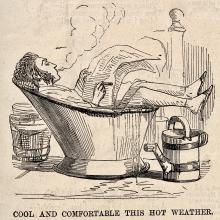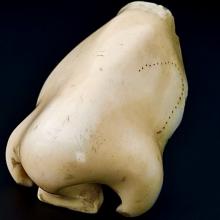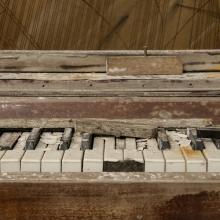
March 1869
Letters to the Editor.
THE WATER SUPPLY.
Sir,—I will be obliged by your inserting the inclosed correspondence. Bailie Russell is not only high in authority, but one of the Special Committee for inflicting the proposed legislative enactments that are likely to saddle us with hundreds of thousands.
We have begged and prayed of the Town Council to pursue the complaints of the want of water to their origin. The Lord Provost has, as he told the deputation from the Ratepayers’ Association the other day, looked into a cistern; whilst Bailie Russell tells Mr Cowan[1] and me he has consulted his neighbour and cabman; and this is all.
Is not this melancholy that men who have the management of our affairs have taken so little pains to qualify themselves for the task. I am, &c. GEO. H. GIRLE.
***
3 Baxter’s Place, March 3, 1869.
Mr Ramsay,
SIR,—Last night, on presenting a requisition from the Calton Ward to Bailie Russell, the subject of water supply was alluded to.
The Bailie said that Henderson the cab proprietor, of Regent Terrace Lane, is regularly short of water; and though I don’t suppose the Bailie has any other case to adduce, as he refers to this rather trifling affair, I would like some explanation, as I think, like all other complaints of the kind, it will be accounted for.—I am, &c. GEO. H. GIRLE.

***
Water Company’s Office, 123 Princes’ Street,
Edinburgh, March 4, 1869.
DEAR SIR,—I have received your letter of yesterday regarding the want of water in the stables of Regent Terrace Lane, occupied by Mr Henderson, cab-proprietor.
I am quite aware that for many years past there has been a want of water in these stables, as well as in others in the same lane. Mr Henderson is the occupier of no less than thirty stalls in that lane; and there are nine more stables occupied by five separate tenants. In addition to those, there are five families residing in the lane.
The whole of these stables and families are supplied from one private three-quarter-inch pipe, so arranged that any one may deprive all the others of water, and quite inadequate for the supply of the numerous occupants dependent upon it.
I have repeatedly pressed the necessity of their laying down one or more additional pipes, so as to remove the inconvenience to which they are subjected from the present mode of supply. There is no want of water in the adjoining houses, all of which are higher than the stables. It is not, therefore, from the want of water in the Company’s pipes that Mr Henderson’s inconvenience arises, but from the want of proper and adequate means to convey to and distribute it in the stables.—I am, &c. ALEX. RAMSAY.
***

72 Northumberland Street, Edinburgh, March 4, 1869.
SIR,—Notwithstanding the numerous letters you have received from your correspondents on this subject, I think they have all omitted a few points which I consider of importance that the public should know.
The first is, that when the Edinburgh Water Company[2] brought a bill into Parliament in 1863 to enable them to purchase land and certain springs for an additional supply of water from Crosswood,[3] there was a clause in that bill giving power to the company to compel the proprietors of houses to provide their tenants with proper cisterns, pipes and complete apparatus; but the Town Council of that day opposed that clause in Parliament, and had influence enough to get it deleted from the bill. And I believe with many other citizens that that accounts for the scarcity of water in many of the poorer houses and not a few of the higher class of dwellings, and the Water Company are quite powerless to remedy the evil.
But there is another point of great importance which deserves the serious consideration of the Town Council and the whole inhabitants of the present time—viz., that by one of the clauses in the bill of 1856, whenever the affairs of the Water Company are transferred to a public trust, that trust shall be bound to take over all their liabilities and debts of every description; consequently the whole expense of prolonged Parliamentary contest, which the Town Council are now creating by a contest with the Water Company, will ultimately have to be paid by the trust—not only their own expenses, but the expenses of the Water Company, which probably may amount to more than twenty or thirty thousand pounds as the outlay of the Water Company will form one of the debts which must be paid by the promoters of this absurd bill.
I am glad to see that the ratepayers are taking steps to fight the Town Council in Parliament, and today slips of a petition to Parliament against this mad scheme are being extensively distributed, and subscription lists to raise money for this purpose have already been largely subscribed to.—I am, &c., JOHN KAY.
Scotsman, 5 March 1869
[Waterless bath image, top: Welcome Collection, creative commons. Photographs: D.M.]
[1] James Cowan would serve as Lord Provost from 1872 to 1874 and as a Liberal MP from 1874 to 1882. See News from the Mews 23, 13.2.74.
[2] The Edinburgh Water Company was established in 1819, and acquired in 1870, using an 1869 Act of Parliament, by the corporations of Edinburgh, Leith and Portobello. Building of the Gladhouse Reservoir in the Pentlands followed, and was completed in 1880.
[3] Crosswood Reservoir in the Pentlands.




